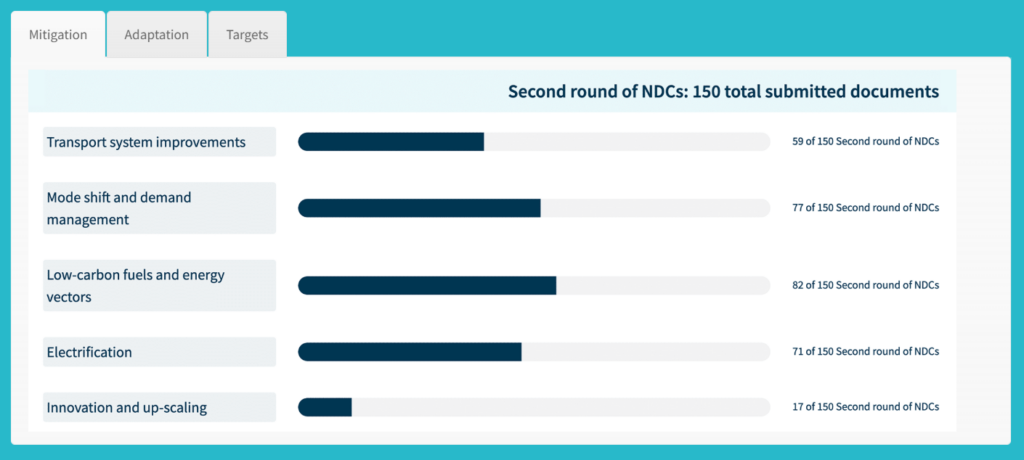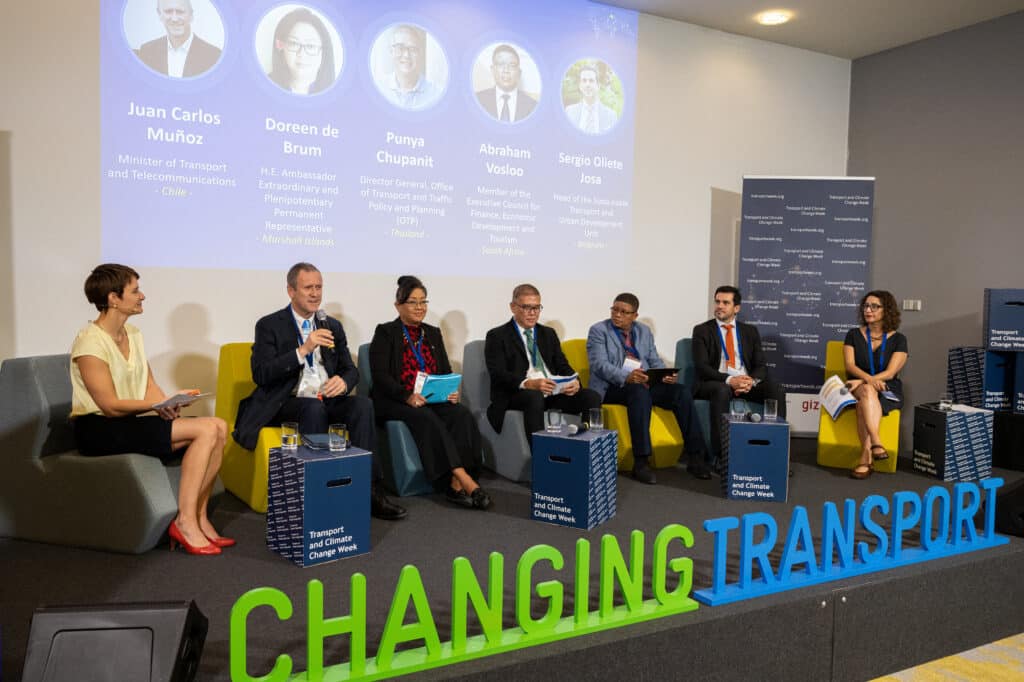
A growing number of economy-wide net zero targets have been announced in recent years. Together they cover 94% of global CO2 emissions. What does this mean for the transport sector? And are sectoral commitments in NDCs in line with these long-term goals? A few weeks before the next COP in Dubai, a high-level panel discussion during the 6th Transport and Climate Change Week discussed how to set sufficient ambition to deliver bold new climate action and trigger transformative change?
The ocean is made out of drops – we all are drops in the ocean. If we all take care of our drop, we can save the world.
H.E. Ms. Doreen de Brum, Ambassador, Republic of the Marshall Islands
Based on numbers from the NDC Transport Tracker, this article takes a closer look at where we are today, refers to what has been discussed in Berlin and draws conclusions about the future needs. The NDC Transport Tracker from GIZ and the SLOCAT Partnership makes it possible to analyse what the NDCs say about transport.
Browse NDCs and LTS’ yourself: The NDC Transport Tracker
The NDC Transport Tracker, developed by GIZ and SLOCAT, is a tool to track the ambition of transport targets around the world. It provides insights into what other countries are aiming to achieve, i.e. what transport actions they have included in their NDCs and LTS, and how this is evolving over time. Results based on the tool have, for example, been used in the latest SLOCAT Transport, Climate and Sustainability Global Status Report – 3rd Edition. The tool also enables peer learning. Countries can check what others have already implemented or are planning to implement and contact their counterparts to discuss and learn from their experiences.

The fact that 101 countries, representing 80% of global CO2 emissions, have announced some form of net zero target shows growing awareness of the threat of global warming and political leadership. However, the NDCs do not yet show the necessary commitment to decarbonise transport.
The nature of net zero targets varies dramatically. Some are simply political announcements, while others have been translated into national legislation. In view of the long-term nature of the targets, making them legally binding is important for stability and continuity of political commitment.
Of the countries that have set a target year for going net zero, 61 have set it at 2050 or beyond. This is a long way off in terms of political election cycles and leaves plenty of room for ‘later’ action. But there is no room for late action, particularly in the transport sector.
Complete decarbonisation of the sector is not possible with a simple technology fix. It requires deep structural and transformative changes in the way people and goods move. Working on the avoid and shift elements is crucial to transform our cities into truly sustainable cities, as Minister Muñoz of Chile’s Ministry of Transport and Telecommunications stressed.
This means investing heavily in infrastructure, often taking many years to complete. But it also requires behavioural changes across the transport industry and among individuals. Efforts are needed to reduce travel and shift to more efficient modes, not only for cities and road transport, but also for maritime and air transport, according to Sergio Oliete Josa from the European Commission’s Directorate-General for International Partnerships (DG-INTPA).
Interim targets can increase ambition and facilitate the identification of effective policy options for the sector. They give direct responsibility to transport ministries. Climate change in general is often dealt with by environment ministries or specific climate change ministries, which do not have a decision-making mandate for transport policies.
However, responsibilities in the sector are often fragmented and fall under several ministries. It is important that those line ministries that make key decisions on transport policy and infrastructure have clear targets to work towards. Who these ministries are will depend on the national institutional set-up. This may mean that, in addition to general targets for the sector as a whole, specific targets are needed for individual sub-sectors. For example, if there is a separate ministry for rail transport.
So far, only 20 countries with net zero targets have also set a national greenhouse gas emission target for the transport sector and only 13 have set intermediate targets. Together, they cover only 9% of global and 12% of transport CO2 emissions. Once more, we see leadership from smaller, highly vulnerable countries such as Fiji, Sri Lanka and the Seychelles. Of the larger emitters, only Japan, the UK and Australia have set GHG targets for the sector.
A further 16 countries have set non-GHG targets for the transport sector. Most of these relate to the introduction of zero-emission vehicles and vehicle efficiency. Such targets can be useful tools to operationalise the more abstract GHG targets and help track progress. However, to ensure that they contribute adequately to the stated long-term goals, it is helpful to embed such non-GHG targets in a clear GHG reduction pathways with intermediate targets.
What ultimately matters is the actual implementation of policies and measures on the ground. Targets, both GHG and non-GHG, are tools to support this implementation, provide direction and enable progress to be monitored. So far, we see a lot of good will, but the implementation of policies and investments for transformation is lagging in most countries. However, it is encouraging that in the second round of NDCs 80 % include at least one mitigation action from the transport sector, which is a clear increase from the 67% in the first round.
The panellists at the Symposium ‘A Glimpse into the Future of Transport’ during Transport Week (transportweek.org) identified three critical points for implementing bold action in the transport sector:
Thailand is also a good example of how an NDC action plan can help to generate the necessary commitment from implementing bodies. Although not yet formally published, a draft was presented and discussed at the Asia regional exchange during Transport Week. Such action plans are essential to move from commitment to implementation and, once in place, will also help countries to develop concrete policies and measures and to better document climate actions in their NDCs.

We need to change behaviour… It is about being able to take action that is not necessarily good for me, but for mother earth – when you give a present to your mother you probably don’t do a cost-benefit-analysis of the present.
Minister Juan Carlos Muñoz, Ministry of Transport and Telecommunications Chile
Tools such as the NDC Transport Tracker can inform this exchange and provide inspiration. But international partnerships are needed to create the confidence that implementation will be supported and that everybody is doing their homework. Transport and Climate Change Week 2023 was delivering peer networks for sustainable mobility (changing-transport.org) and created the confidence, that changing transport is feasible.
The Mobilize Net Zero project team is organising the Transport and Climate Change Week, alternating between a virtual and face-to-face format. It further maintains and updates the NDC Transport Tracker. The project is implemented by the Deutsche Gesellschaft für Internationale Zusammenarbeit (GIZ) GmbH and is funded through the International Climate Initiative (IKI) of the German Federal Ministry for Economic Affairs and Climate Action (BMWK).
 H.E. Ms. Doreen de Brum, Ambassador of the Republic of the Marshall Islands speaking at Transport and Climate Change Week ©GIZ
H.E. Ms. Doreen de Brum, Ambassador of the Republic of the Marshall Islands speaking at Transport and Climate Change Week ©GIZ

Daniel Bongardt
daniel.bongardt@giz.de
Visit profile